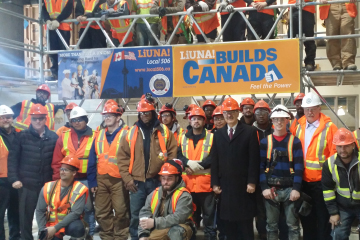LiUNA! Local 506 serves a diverse group of over 8,000 workers in the construction and industrial sectors. It considers itself one of the most multicultural unions in North America. Started during waves of Irish and Scottish immigrants, LiUNA!’s membership has evolved alongside immigration patterns.
The construction industry in Canada is a significant economic driver, accounting for 9% of Canada’s GDP. As with many skilled worker sectors, future labour demands are high and immigrants are considered an important current, and future, source for that talent.
For construction firms and other sector employers thinking about the benefits of diversity, LiUNA! offers a useful lesson. LiUNA! staff and leadership come from their diverse membership itself. LiUNA! Local 506 recognizes that inclusion doesn’t mean treating everyone the same. It means providing the different supports they need to have equal access to training and employment.
Merissa Preston, LiUNA! Local 506 Training Liaison, says that supporting their members is key. “If we get a call for a specific training need, even something we don’t offer all the time, we’ll organize it just for them. If our members need it, we just do it.”
With Italian, Polish and Portuguese-speaking trainers, Spanish and Arabic-speaking business representatives on staff, when language support is needed, staff provide it. When large groups of new immigrants work together, they tend to communicate in their common language. Over time, like many immigrants, LiUNA!’s immigrant members have learned English. They communicate effectively on the job site, and access training and support in English.
However, according to Preston, the Portuguese membership has requested safety training in their native language. This ensures that members are prepared for safety training, re-certification or more rigorous hand-on exams, mandated by the Ministry of Labour like the new Working at Heights Training.
The solution for LiUNA! Local 506 was obvious: give them the support they need. Portuguese speaking trainers provide interpretation during training and testing. Information and tests are run in English, interpretation is provided as needed. The result is LiUNA! Local 506 members are able to continue providing their skilled work on the job site. If other languages are needed in the future, Preston says they will provide that support.

Minister Reza Moridi visit with apprentices.
English, integration and working with Syrian refugees
While they give support when called upon, Preston emphasizes the importance of speaking and understanding English on the job site. LiUNA! Local 506 instills the need to improve English skills in their members. From a health and safety perspective, English is essential. However, Preston says that understanding English is also important if members move into jobs in other sectors, or with other employers.
As immigration patterns change, LiUNA! Local 506 membership is also evolving, just as it always has. Preston says they want to support newer Syrian refugees who are interested in working in construction trades. They are looking into how best to recruit Syrian refugees for apprenticeship training and help get them working in the field.
Since different groups need different supports, Preston wants to ensure the Syrian refugees they work with are set up to succeed. She notes how some people might have preconceived notions about particular immigrant groups, such as newer refugees: “We don’t want to put them on a job site and make them a target for employers or other workers. We want them to be able to integrate into the job site like anyone else.”
Preston says they want to support them not only with apprenticeship and workplace skills, but also so they can communicate effectively on the job site. For her, integrating into the job site means ensuring they have adequate English language skills.
Recognizing that they are not English trainers, LiUNA! Local 506 has partnered with ACCES Employment and the Ontario Masonry Training Centre. This partnership will leverage each of their strengths. LiUNA! Local 506 will provide technical expertise, outlining what the Syrians need to know on the job and work site. OMTC will work closely with LiUNA! Local 506 to provide hands-on training to participants and ACCES Employment will create pre-apprentice language training, programming and employment supports to get participants ready for work.
For LiUNA! Local 506, it’s important to support members on the job. It is equally important to prepare them for success through training. Challenges such as language or recently arrived newcomers are seen simply as opportunities to serve and support their members. Their approach illustrates how unions, employers and community groups working together ensures that immigrant talent, new and old, will thrive.
Magnet, Ryerson University in partnership with Hire Immigrants produced this article. The article is made possible with the funding from the Government of Ontario.
